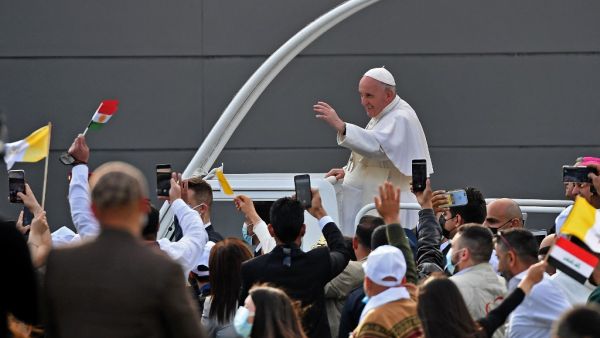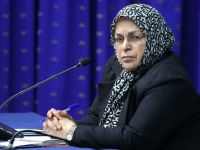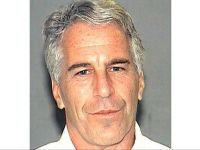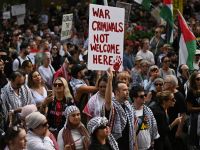Pope Francis ended his historic tour of Iraq on Monday, departing by plane from Baghdad after visiting conflict-torn cities, meeting Muslim and Christian leaders and preaching peace and coexistence over war.
Francis waved one last time from before boarding a plane flying the Vatican and Iraqi flags from its cockpit windows. President Barham Salih accompanied the 84-year-old pontiff down a red carpet to his flight.
The pope's visit with Grand Aytatollah Ali al-Sistani, 90, Iraq’s most revered Shiite authority, focused attention on voices of peace and tolerance in the country that are often drowned out by those promoting violence. https://t.co/cYdIDNTzKC
— New York Times World (@nytimesworld) March 9, 2021
During his trip, the first ever papal visit to Iraq, Francis toured four cities, including Mosul, the former ISIS stronghold where vast areas still lie in ruins, telling Iraqis that “peace is more powerful than war.”
He said Iraq would “always remain with me, in my heart.”
At every turn of his trip, Francis urged Iraqis to embrace diversity — from Najaf in the south, where he held a historic face-to-face meeting with powerful Shia cleric Grand Ayatollah Ali al-Sistani, to Nineveh to the north, where he met with Christian victims of ISIS terror and heard their testimonies of survival.
The pontiff’s visit witnessed scenes unimaginable in war-ravaged Iraq just a few years ago.
In Iraq’s south, Francis convened a meeting of Iraqi religious leaders in the deserts near a symbol of the country’s ancient past — the 6,000-year-old ziggurat in the Plains of Ur, also thought to be the birthplace of Abraham, the Biblical patriarch revered by Jews, Christians and Muslims. The gathering brought religious representatives across the country rarely seen together, from Muslims, Christians, Yazidis and Mandaeans. The joint appearance by figures from across Iraq’s sectarian spectrum was almost unheard-of, given their communities’ often bitter divisions.
The pope called on them to work together and make peace.
In the city of Najaf, Francis held a private meeting with the notoriously reclusive al-Sistani, among the most influential and revered Shia clerics, and together they delivered a powerful message of peaceful coexistence and affirmed the rights of Iraqi Christians. It was a powerful message the Vatican hopes can preserve the place of the thinning Christian population in the tapestry.
Sistani is one of the most senior clerics in Shia Islam, deeply revered among Shias in Iraq and worldwide. His rare but powerful political interventions have helped shape present-day Iraq. Their meeting in Sistani’s humble home, the first ever between a pope and a grand ayatollah, was months in the making, with every detail painstakingly negotiated beforehand.
Pope Francis on historic risky Iraq visit calls for end to 40+ years of brutal violence, wars, sanctions, & displacement. Enough persecution of religious, racial, & ethnic minorities. Pope Francis’ historic visit to Iraq, in images - The Washington Post https://t.co/xapWPJpHNo
— Mam Ibraheem, MD (Neurologist) (@mamibraheem) March 6, 2021
In the northern city of Mosul, Francis prayed in a square containing the remnants of four churches — Syriac Catholic, Armenian Orthodox, Syriac Orthodox and Chaldean — nearly destroyed in the war to oust ISIS from the city.
Later, in the Christian town of Qaraqosh, where an entire Christian community was forced out by the brutality of ISIS militants, Francis urged Christians to forgive their oppressors and rebuild their lives.
People gathered in crowds to catch a glimpse of the pope wherever he went, fuelling coronavirus concerns. Few wore facemasks, especially during Francis’s stops in northern Iraq on Sunday. That day ended with an open-air mass in a stadium that drew nearly 10,000 people. Security was tight and most events were strictly controlled.
Public health experts had expressed concerns ahead of the trip that large gatherings could serve as superspreader events for the coronavirus in a country suffering from a worsening outbreak where few have been vaccinated. The pope and members of his delegation have been vaccinated but most Iraqis have not.
Iraq is in the midst of another wave of the coronavirus, spurred by a new, more infectious strain that first appeared in the UK. Authorities in Iraq recorded 4,068 new infections on March 6, according to health ministry figures, up significantly from infection rates at the start of the year.
In total 13,500 people have died among a total 720,000 infections.
This article has been adapted from its original source.








